Flu season brings with it every unwanted illness, stuffy nose, and itchy throat we’d do anything to soothe.
Whenever we find ourselves inflicted with sickness, our first thought is to cure our coughs by any means possible.
While Vicks VapoSteam can alleviate our pain, do we ever ask ourselves whether it is safe for our pets?
Vicks VapoSteam contains ingredients and oils that help humans but harm animals.
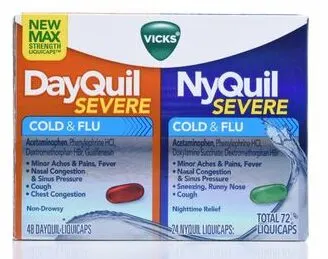 Never prolong your pet’s exposure to these substances, and keep cats out of any room actively distributing VapoSteam.
Never prolong your pet’s exposure to these substances, and keep cats out of any room actively distributing VapoSteam.
However, scentless humidifiers can help rejuvenate a cat’s skin and nasal passages.
The knowledge that Vicks VapoSteam can harm our pets should deter us from utilizing that product, but not humidifiers altogether.
In fact, educating ourselves on the benefits of pet-safe humidifiers can increase our cat’s quality of life to exponential degrees.
What Is Vicks VapoSteam?
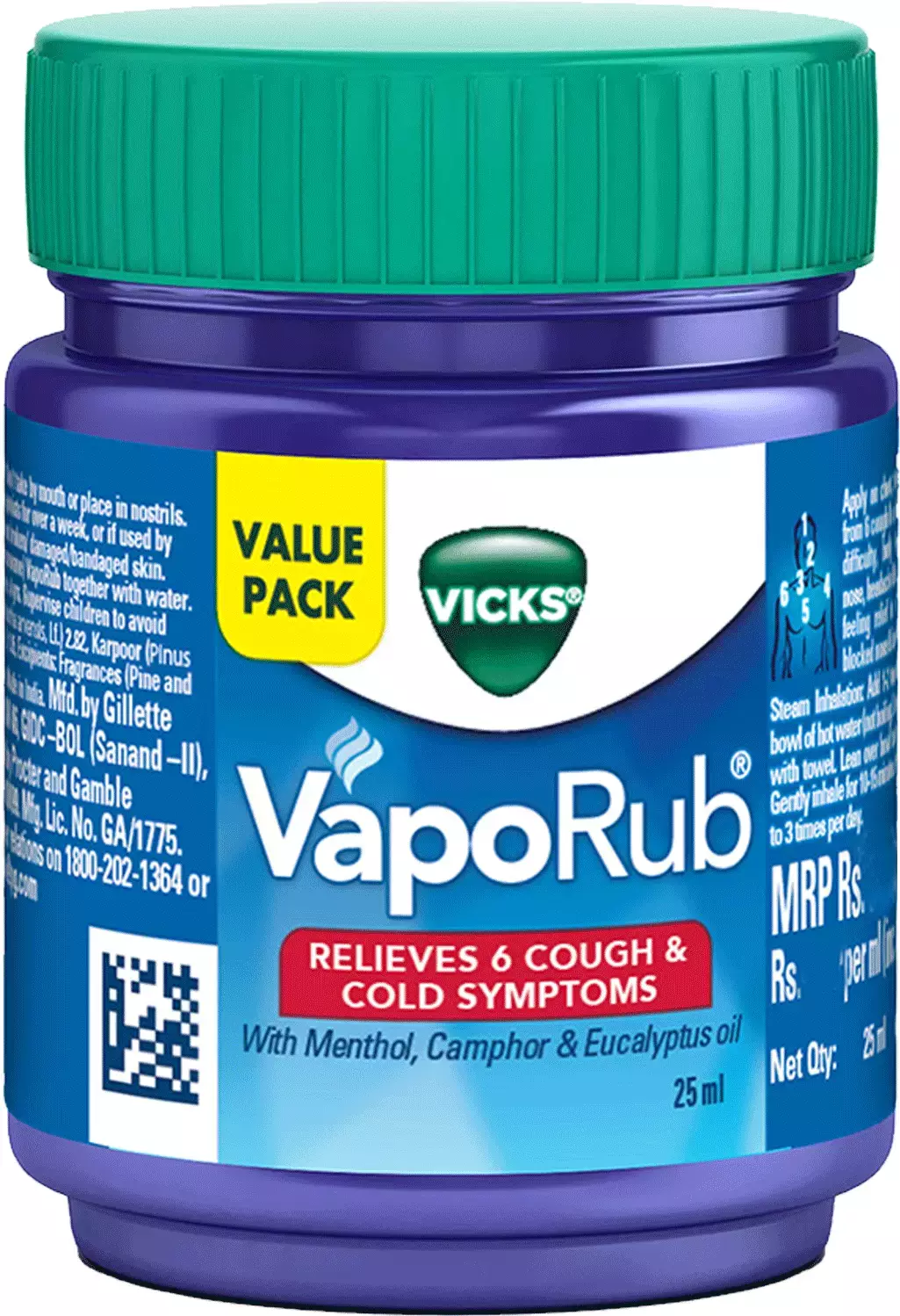 Despite Vicks’s apparent threat to pets, that should not prevent humans from understanding and utilizing it.
Despite Vicks’s apparent threat to pets, that should not prevent humans from understanding and utilizing it.
VapoSteam has proven to help people stricken with colds from having their symptoms develop further. The trick is learning about Vicks VapoSteam to determine when – and when not – to use it.
Vicks markets their VapoSteam as a medicated steam that can function with warm mist humidifiers.
Their product supposedly relieves cough symptoms in humans suffering from colds, allergies, or other respiratory issues.
However, their alleged safety with humans does not ensure the same protection for your pets. One look at the ingredients will show evidence of why this concoction can cause more harm than good.
What Is In Vicks VapoSteam?
 The primary ingredient to create Vicks VapoSteam is a cough suppressor called camphor.
The primary ingredient to create Vicks VapoSteam is a cough suppressor called camphor.
Other ingredients include alcohol, silicone, a handful of chemicals, and three oils: nutmeg, eucalyptus, and cedar leaf.
While the chemicals surprisingly show no signs of danger, one of the listed oils causes problems for our pets. The culprit? None other than nutmeg oil.
Nutmeg Is Dangerous For Cats
Nutmeg is a naturally toxic substance when ingested by cats. However, when its oil is continually inhaled, it causes long-term internal damage.
Veterinarian Beth Malinich reported that these oils could damage a cat’s liver beyond repair.
Liver damage isn’t the only danger that nutmeg presents. Inside nutmeg lies a neurotoxin known as myristicin that, in large quantities, can cause any number of side effects, including:
- Seizures
- Dry mouth
- Disorientation
- Hallucinations
- Increased heart rate
- High blood pressure
- Abdominal pain
While no one knows what quantity of these toxins triggers their related symptoms, why even take the risk?
Instead of investing in Vicks VapoSteam, if you have pets, skip the oils and stick with a humidifier instead.
Menthol Can Cause Problems For Your Cat
Another ingredient in Vicks Vaposteam is menthol. Although it is not harmful if inhaled, it’s worth noting that cats can go crazy for the scent.
It’s not entirely understood why, except for the fact that cats have an intense sense of smell and like the pungent aroma. It’s like how they go nutty over catnip, and some cats adore earwax.
But beware, because the smell can attract your attention so much that they try to get ahold of the Vaposteam packs. If your cat ingests menthol, it can be fatal.
For this reason, it’s also critical not to apply Vicks VapoRub or other pain creams like Biofreeze or Bengay to your cat.
Likewise, if you apply them to yourself, wash your hands thoroughly before handling your cat. Also, ensure your cat doesn’t rub against or lick you after applying the ointment or spray.
Eucalyptus Oil Is Toxic To Cats
Similar to nutmeg oil, eucalyptus oil also causes ill effects in cats. Even inhaling the oil after it’s diffused throughout the air can cause health consequences.
Possibilities include aspiration pneumonia, among other toxicity issues. Take extra precautions if you insist on using Vicks Vaposteam in your humidifier.
Ensure that your cat remains in a separate room until the VapoSteam dissipates.
How Does Vicks Vaposteam Work In A Humidifier?
When combined with a product like Vicks VapoSteam, the water inside the humidifier’s reservoir is replaced with the vapor fluid instead.
Humidifiers boil this water until it steams before releasing it throughout the room. Because the solution must be boiled, Vicks VapoSteam only functions in conjunction with warm mist humidifiers.
Humidifiers’ medical capabilities are what draw people towards Vicks VapoSteam. VapoSteam moistens dry breathing passages and prevents coughing from irritated throats.
This, combined with the natural power of a humidifier, makes Vicks’ product a valuable commodity for under-the-weather customers.
Can Cats Benefit From Humidifiers?
In some cases, humidifiers could help your cat, but most times, it’s likely, not necessary.
But, if your cat suffers from asthma, the American Society for Prevention of Animal Cruelty (ASPCA) believes humidifiers make a difference.
The air is drier in wintertime, and dry air can worsen asthma. When your cat has to deal with clogged nasal passages day after day, this can be detrimental.
After all, cats have an intense sense of smell that they rely on.
Therefore, clogged nasal passages inhibit your cat’s sense of smell and can be confusing and frustrating. Plus, if your cat can’t smell their food, it might not want to eat it.
Therefore, your cat could benefit from a humidifier in the winter to combat the effects of the dry air.
However, it’s still necessary to avoid Vicks VapoSteamwhen using a humidifier with your cat. Although it helps open up congested nasal passages in humans, the same does not apply to pets.
Even if you notice a change in your cat’s breathing ability, VapoSteam was not made with animals in mind. Vicks’ temporary solution to their asthma may instead cause permanent problems for their body.
Which Humidifiers Are Safe for Cats?
Any household searching for a humidifier to help their pets should educate themselves before purchasing.
While any humidifier should soothe your pets well enough, some models prove more beneficial than others.
However, before you go out and buy a humidifier, ensure that you don’t already own one without knowing. Specific HVAC units come pre-installed with humidifiers integrated into their systems.
Check your unit; if it contains these features, learn to use what’s already available.
Not every household comes equipped with these appliances already. If your HVAC lacks a built-in humidifier, you can choose an evaporative or ultrasonic machine.
However, remember, only use humidifiers with water. Avoid adding oils or other products that could irritate or harm your cat.
Evaporative, Ultrasonic, and Cool-Mist Humidifiers
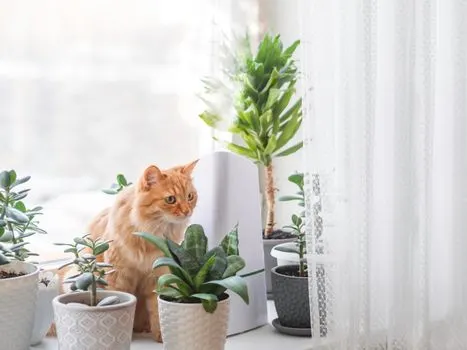 Certain humidifiers, like evaporative and ultrasonic options, can be safe, but both options come with some concerns. Evaporative humidifiers could tip over, burning your cat.
Certain humidifiers, like evaporative and ultrasonic options, can be safe, but both options come with some concerns. Evaporative humidifiers could tip over, burning your cat.
Or your curious kitty could drink the water, so keep it out of reach.
Ultrasonic humidifiers operate at high frequencies, producing moisture droplets to disperse into the air. These frequencies are unheard of by humans but could be troubling for your cat.
These concerns cause families to veer more towards cold mist humidifiers, regardless of their neighborhood’s climate.
These lack the power to debilitate bacteria but serve every other purpose faithfully without threatening your animal’s health.
Therefore, if your cat’s asthma is your main reason for using a humidifier, this would be all you need.
Related Questions
Are essential oils safe for pets?
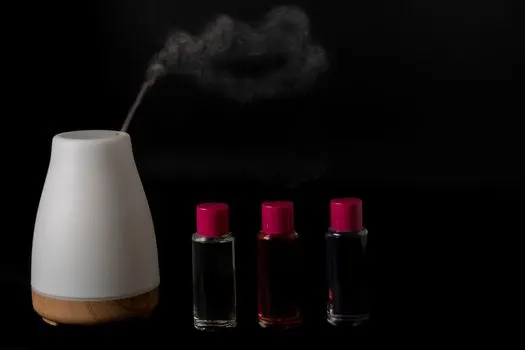 The booming popularity of essential oils in recent years has caused pet owners to wonder about their effect on animals. Studies continue to investigate these outcomes with varying degrees of success.
The booming popularity of essential oils in recent years has caused pet owners to wonder about their effect on animals. Studies continue to investigate these outcomes with varying degrees of success.
Most studies agree with Dr. Malinich that prolonged exposure to essential oils poisons animals. Keep diffusers and humidifiers alike free of scented additives.
If you want to find a way to calm your pets, opt for pet-specific products like Adaptil and Feliway. If your cat struggles with anxiety, it’s worth talking to your vet.
You can work on behavioral modifications; your vet might even prescribe pet-friendly medication for your furry friend.
What other chemicals are dangerous to cats?
One of the primary threats to your cat’s health comes from a common household item: bleach. Cat’s heightened sense of smell attracts them to dishwasher and clothing detergents.
The alluring scent of bleach can entice your cat to eat it. Like with humidifiers, keep bleach far out of the reach of cats and stored in a sealed location.
Refrain from keeping your pets around the smell if needing to continually use detergent, as it can internally damage them.
Overall, keeping all household cleaners in a safe location is a good rule of thumb. Putting them up on a high shelf won’t work with most cats. They love to climb, perch, and hunt.
Their curious natures also lead them to open cabinets and get inside. Therefore, your best bet is to store toxic substances in a locked cabinet or locked room, such as a laundry room.
Stacy is a lifelong animal lover who truly believes life just isn’t complete without pets. She’s had pets her whole life (including three dogs and a cat living under the same roof, somewhat harmoniously). She currently resides in NOLA with her husband, son, and two pups, Scooby “Dooby” Doo and Zoey. Stacy always makes a point to learn everything she can about her fur babies, and she has been writing about the pet-parent life for over two years.

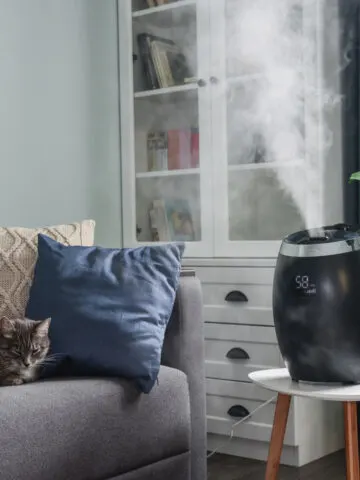

Leave a comment
You must be logged in to post a comment.